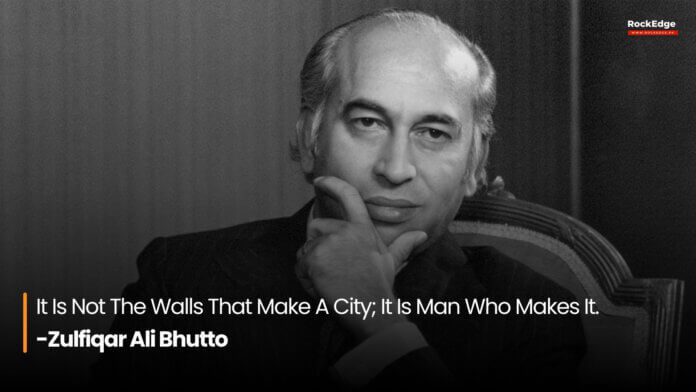Zulfiqar Ali Bhutto, Born on January 5th, 1928 & Died on April 4th, 1979, was a Pakistani barrister and politician who served as the country’s fourth President.
It is Not the Walls that make a city; It is man who makes it.
-Zulfiqar Ali Bhutto
Let’s Know About Zulfiqar Ali Bhutto, 1971 to 1973 as the country’s ninth Prime Minister 1973 to 1977. In 1973, his government created Pakistan’s Constitution, which is still in effect today. He founded the Pakistan People’s Party (PPP) and served as its chairman until his assassination.
His daughter Benazir Bhutto later led the PPP and served as Pakistan’s 11th and 13th Prime Minister; his grandson Bilawal Bhutto Zardari is the current chairman of the PPP and the country’s Foreign Minister.
Education
Bhutto was born in Sindh and educated at the Universities of California, Berkeley, and Oxford before entering politics as a cabinet member of President Iskander Mirza and was assigned to multiple ministries during President Ayub Khan’s military government beginning in 1958.
Career
Bhutto was appointed Foreign Minister in 1963 and was a supporter of Operation Gibraltar in Kashmir, which led to war with India in 1965. After the Tashkent Accord ended the war, Bhutto fell out with Ayub Khan and was fired from the administration.
Bhutto launched the PPP in 1967 on a socialist platform and ran in the 1970 general election against President Yahya Khan. While the Awami League won a majority of seats nationwide, the PPP won a majority of seats in West Pakistan (where the Awami League did not win any seats); the two parties were unable to reach an agreement on power-sharing and a new constitution.
Many in West Pakistan, including Bhutto and President Yahya Khan, saw the Awami League’s Six Point Campaign as a method to divide the country. The refusal of Bhutto and Yahya to accept a Bengali as Prime Minister of Pakistan sparked protests in East Pakistan, and the counter-measures adopted by the Army, ordered by Yahya Khan and supported by Bhutto, resulted in the establishment of Bangladesh.
Also Read: Every Pakistani can Register for Driving License in Lahore
Simla
Following Pakistan’s defeat in the war against Bangladesh-allied India in December 1971, Bhutto became the president and declared an emergency. When Bhutto began reconstructing Pakistan, he claimed that his goal was to “rebuild confidence and hope for the future.”
After signing the Simla Accord in July 1972, Bhutto reclaimed 93,000 prisoners of war and 5,000 square miles (13,000 km2) of Indian-held territory. He improved relations with China and Saudi Arabia, acknowledged Bangladesh, and hosted the second Organization of the Islamic Conference in Lahore in 1974.
Leadership
Domestically, under Bhutto’s leadership, parliament unanimously approved a new constitution in 1973, following which he selected Fazal Ilahi Chaudhry as President and assumed the newly empowered role of Prime Minister. He was also instrumental in launching the country’s nuclear program. Bhutto’s nationalization of many of Pakistan’s embryonic businesses, healthcare, and educational institutions, on the other hand, resulted in economic stagnation.
After the upheaval caused by the dissolution of provincial feudal governments in Balochistan, Bhutto also authorized an army operation in the region in 1973, resulting in hundreds of civilian casualties. Notwithstanding civil unrest, the PPP easily won parliamentary elections in 1977.
The opposition, however, claimed extensive vote manipulation, and rioting erupted across the country. Bhutto was toppled in a military coup on July 5, of that same year, by his nominated army chief Zia-ul-Haq, before being controversially prosecuted and killed by Pakistan’s Supreme Court in 1979 for authorizing the murder of a political opponent.
Bhutto remains a divisive figure, praised for his nationalism and secular internationalist ideology while being chastised for intimidating his opponents and violating human rights.
Party
He is widely regarded as one of Pakistan’s finest leaders, and his party, the PPP, remains one of the country’s largest, with his daughter Benazir Bhutto served as Prime Minister twice, and his son-in-law and Benazir’s husband, Asif Ali Zardari, serving as President.
Source: Wikipedia




